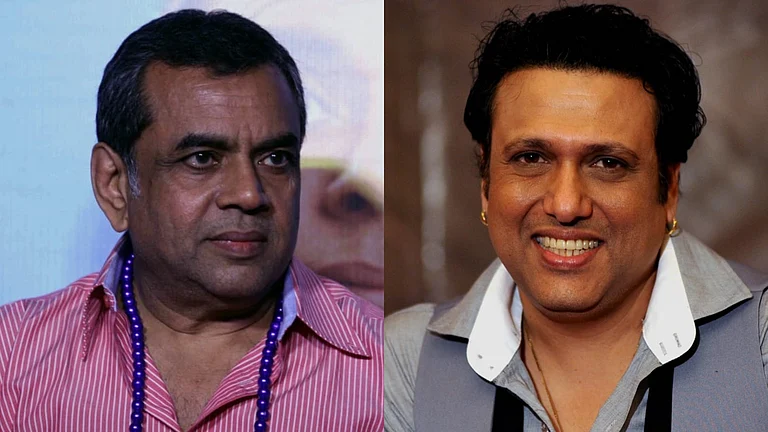He didn't know when the rain had stopped and started again the previous night but, early in the morning, it seeped into his porous sleep, turning it into a weak composition of dreams and consciousness, much like a watercolor painting where the dark notes were made watery and pale for an immediate effect. While his sleep was merging with the encompassing wetness and pattering of rain, he woke up early in the morning to welcome yet another rainy afternoon at Chrysanthemum Street with a Modigliani painting.
He knew that, with each passing rain drop, the world would shrink for him and, he knew, she would at last fit into his eyes.
Clouds hung over the city like numerous soiled clothes dripping with water. Between the spells of shower, the heavy air - loaded with humidity – sat on the cornices of old crumbling buildings with worn out trellises of Chrysanthemum Street. The street smelt of rust.
It felt, as if, every space in it – its old buildings with fine lattice works, Gothic pillars and porticoes were packed with old rust. As if, with monsoon, the houses started corroding like old sea-going vessels now abandoned after too many voyages.
Even Park Street, which darted out from Chrysanthemum Street emptying one-way traffic, looked almost like a harbour of finely crafted old schooners with its once grandiose, now aging white buildings. The pervading smell rested on the terraces, porticos and on the shoulders of the headless nymphs along the parapets and cornices of imposing architectures with tablets of different shapes and sizes proclaiming their colonial ancestry. The city, born to harbour schooners that came in hordes from the Bay of Bengal like shoals of shads coming on to the warm, sweet water to rest and breed quietly in Hooghly river, was corroding fast .
It, now bereft of its past, could only imitate its own history within the encompassing void that the rain creates in monsoon. The pervading wetness metamorphosed everything into what it had been rather than what it was now.
Everything, surprisingly, smelt of rust: the rutted streets, the puddles that were collected on those streets after the spell of shower, the people pacing in the streets with umbrellas wide open- as if umbrellas were natural extensions to their bodies that rose from their palms like individual canopies. A person, a tree. The hazy steel scaffolds of Howrah Bridge in the distance - resembling exactly like the internal framework for two huge breasts, waited expectantly beneath a gloomy sky, the trees now darker with rain, the lonely light posts – everything smelt of old rust. The monsoon had swallowed up the city entirely, at last.
He could feel that she also smelt of rust. Was rain corroding her, too? He looked again at the thin bluish veins crisscrossing the smoothness of her hands. Now she placed both her hands on the table as if to make a point without saying anything. He knew that she was watching him intently. Like the dead grandfather clock in her bedroom-cum-living room-cum dining room-cum a rented one bedroom flat in south Calcutta.
Everything looked almost the same. Neatly arranged books on the racks, CDs, DVDs, rows of tea tables on one side, lovers and readers on chairs, glass panels facing the Chrysanthemum Street. Except, maybe, him.
He shifted his gaze outside the bookstore. The Words Worth.
She cleared her throat. He knew that she was only getting ready for her long, structured sentences. When confronted with something she did not understand or she did not intend to understand, she built up her defense with well-syntaxed, punctuated, long sentences. Brick by brick. Like making an invisible structure visible.
‘Look, I don’t have much choice left now. Other companies are in no better shape either. But I have to leave Calcutta. ’
She pursed her lips and heaved a sigh.
Her eyes were tired. He knew that she was anxious. Anxious about her decision which was waiting silently to claim a victim. Suddenly, he felt like a dead man.
He shifted his gaze to the table. Teacups, milk pot, a sieve, a single cut flower on a pipe like steel vase, her hands with blue veins, his with clipped nails.
' I don’t know what to say. Well, I won’t ask you to do anything you don’t like,’ he said haltingly. He knew that he was talking like a voice, not a person. A voice, over which he did not have much control.
She frowned. A perfect frown, he knew it. Then she pouted. Beautiful. He knew it as well.
Two hands, a cut flower. If it were an installation art, what would have been its name? Flower, two judging hands- male and female. Love?
Or, a cut flower, two hands separated by distance. Loss?
Did the opposite of love always signify only loss? Lovelessness might be tinged with a sense of void as well , he thought.
Looking at him intently, she slumped in her chair like a rag doll.
He found a pair of kohl-lined eyes staring at him. A dimple on the right cheek, a throbbing vein at the base of the neck. Now she placed both her hands on the table as if to make a point without saying anything. He knew that she was watching him silently again. Like the dead grandfather clock in her bedroom- cum- living room-cum-dining room- cum- a rented world.
‘Look’, she said. He looked at her. A Modigliani painting.
‘Why don’t you convince yourself that this is a passing phase? You know pretty well that it won’t last long! Everything will be alright again. Don’t jump to conclusions! Take a few days off to deal with your emotions.’ She seemed both persuasive and considerate.
He found her voice faintly melodious. Rising up and falling down rhythmically like a distant siren. Was she apprehensive of something that she could not comprehend?
‘I don’t really think everything will ever be the same again.’ He eased out a little in the chair feeling empty. With slight difficulty, he added, ‘Life will not be the same again.’
‘Hmm!’
He saw that she was touching the cut flower absentmindedly. She did not tell him to move to another city with her. He saw that she was trying to think very hard.
A line flashed in his head like a faint smell - ‘Listen, Lydia, nothing matters now, when the rain stops and we draw circles around us’. Lydia? Where did he get this name? Why not her name? ‘Listen, you, nothing matters now ……….’ No, it did not sound flowing enough, only a statement. Why didn't she tell him to move in with her?
He called the attendant. She had to return to her office, the last of the three offices in Calcutta, by 2.30 in the afternoon.
‘Where will you go now? Did you take a leave today?’
Her voice was again playing like a distant siren. Up and down. ‘I mean, home or office? ’ She leaned forward.
He did not say anything.
He looked at her again. She was looking hard at the glass top. ‘Look, it's a better offer. I need to move. Just don’t brood.”
She had finished talking unmindfully. He knew that she was giving a conditioned response without actually thinking of him. She might be quoting from an article on life after break up. He looked at the calendar above her head. Two days. They wouldn't be under the same leaky sky.
She placed her hand over his. Her palm felt moist. She was nervous. ‘What remains in touch, Lydia?’
He got the missing lines, which were making endless rounds in his head.
‘Circles of red, yellow, blue and brown, each holds a life of its own’.
It was almost 2.30 pm. She was lost in thought. He stood up. She looked into his eyes.
He somehow felt that this abrupt ending might also have been a relief to her– a temporary suspension of everything that needed to be done now. Like a rain.
Did anybody know what exactly needed to be done? Or everyone, permanently torn between choices, at last, let the choices decide what they wanted of him or her?
When they came out in the street he got the smell of rust again. The monsoon had started licking Calcutta with its thousand tongues of showers.
Rain was falling like a solace to the ageing city, which had been busy in and amazed at the decay that had set in. It felt that millions of rain Gods were born inside raindrops at that moment over Calcutta, arriving with the monsoon, riding the rain drops and coming out tearing the fine membrane of thousands of spherical drops of rain to tear him away from reality.
Everything was a blur. A water washed sky and a rusting city.
He knew that Calcutta was turning into an old sea faring vessel again. Without a destination. He felt the rain dipping over his eyelids.
Everything was a blur under a meaningless sky above and a rusting city below. Standing at the crossroad where Chrysanthemum Street met Theatre Road, he felt that fine water droplets were settling on his eyelids. He looked at her. A smudged, familiar yet unfamiliar torso of a woman blurred by the descending rain at Chrysanthemum Street looking for a yellow taxi. Did he really know her?
He felt that rain never ceased to fall from the sky – the void, which we used to harbor inside us.


















.jpeg?w=200&auto=format%2Ccompress&fit=max)



